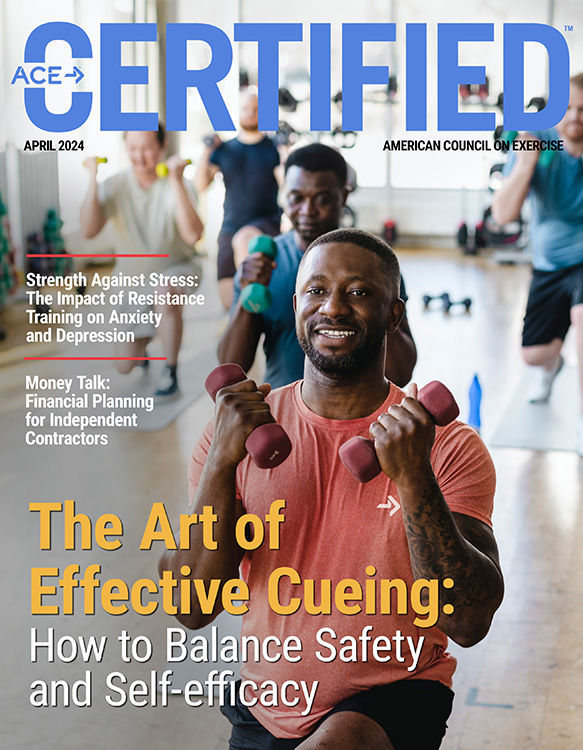
Strength Against Stress: The Impact of Resistance Training on Anxiety and Depression

There is no shortage of studies demonstrating that regular exercise can help people improve their moods and control their stress levels, but most of the research has focused primarily on the impact of cardiorespiratory training. Now, a new research review from researchers at the University of Limerick (UL) in Ireland and Iowa State University has shown that resistance training can also be an effective way to alleviate symptoms of anxiety and depression.
The researchers, who published their findings in the journal Trends in Molecular Medicine, believe they have uncovered “exciting evidence” that resistance training may be an accessible alternative therapy to improve anxiety and depression like more established therapies, while also improving other important aspects of health.
“Anxiety and depressive symptoms and disorders are prevalent and debilitating public health burdens for which successful treatment is limited,” explains Dr. Matthew P. Herring, who co-led the study with Dr. Jacob D. Meyer of Iowa State University. Obviously, Dr. Herring continues, the healthful benefits of resistance training are well established. “However, the potential impact of resistance exercise training in the treatment of anxiety and depressive symptoms and disorders remains relatively understudied. Moreover, the plausible psychobiological mechanisms, which help us to better understand how and why resistance exercise training may improve these mental health outcomes, are poorly understood.”
The Study
Drs. Herring and Meyer began their study with the idea that there was sufficient evidence from previous and ongoing research at UL and the National Institute of Health–funded research conducted at Iowa State University to suggest that resistance training improves anxiety and depressive symptoms and disorders. After synthesizing the available evidence from randomized controlled trials (RCTs), meta-analyses and quantitative reviews, they found that resistance training can lead to small to moderate improvements in anxiety and significant reductions in depressive symptoms.
Furthermore, the researchers were able to propose several mechanisms by which the mental health benefits of resistance training occur, including changes in neurotransmitters, neurotrophic factors, neuroanatomical structure and function, and improvements in cerebral blood flow and controlled breathing techniques.
More Research Needed
While preliminary evidence supports the beneficial effects of resistance training on anxiety and depression, the researchers argue that there is a pressing need for larger, more definitive RCTs that address current research gaps. These include understanding the minimum effective dose, the comparative effectiveness of resistance training against standard therapies, and a deeper exploration into the psychobiological mechanisms at play.
“There is a critical need for confirmatory, definitive trials that adequately address limitations, including small sample sizes, but the limited evidence available to us provides initial support for the beneficial effects of resistance exercise training on these mental health outcomes, including increased insulin-like growth factor 1, cerebrovascular adaptations, and potential neural adaptations influenced by controlled breathing inherent to resistance exercise,” Dr. Herring explains. “As resistance training likely works through both shared and distinct mechanisms to achieve its positive mood effects compared to aerobic exercise, it has the potential to be used in conjunction with aerobic exercise or as a standalone therapy for these debilitating conditions.”
What the Research Means to Health and Exercise Professionals
Given how prevalent anxiety has become, chances are high that you will encounter clients who either experience anxiety or are at risk for developing it. While it is outside your scope of practice to diagnose or treat any form of mental illness, it is important that you provide your clients with the tools and information they need to live healthier lives, both physically and mentally. To that end, sharing the positive mental health benefits of exercise with your clients is essential.
This study highlighted the benefits of resistance training for alleviating symptoms of anxiety and depression, and previous research suggests that moderate-to-high intensity exercise may offer greater anxiety-reducing benefits than low-to-moderate intensity exercise. However, it is essential to recognize that any type of exercise, whether aerobic or resistance training, mild or vigorous, offers significant benefits. And for some of your clients, vigorous exercise simply isn’t an option. As always, the most effective exercise—whether for increasing fitness or reducing anxiety—is the one a person will actually do regularly.
Expand Your Knowledge
Sleep, Stress Management and Recovery
This first-of-its-kind program equips you with the comprehensive science and advanced coaching methods you need to help everyone—from everyday people who are stressed-out and struggling to see results, to elite athletes and top performers who are seeking that extra edge—achieve restorative sleep, manage daily stressors and learn how to recover in ways they never knew existed.
A Holistic Approach to Mental Health
As the conversation around mental health grows, health and exercise professionals have an exciting opportunity to positively impact people’s mental well-being and overall health through services and programming while staying within their scope of practice. This course offers insight from five industry experts who share their knowledge about various factors of wellness that can impact your clients’ mental health. Through each session, you’ll learn how to expand your offerings and assist your clients in their quest for better mental health and well-being.

More Articles
- Certified™: April 2024
The Art of Effective Cueing: How to Balance Safety and Self-efficacy
Contributor
- Certified™: April 2024
Money Talk: Financial Planning for Independent Contractors
Contributor




 by
by 



